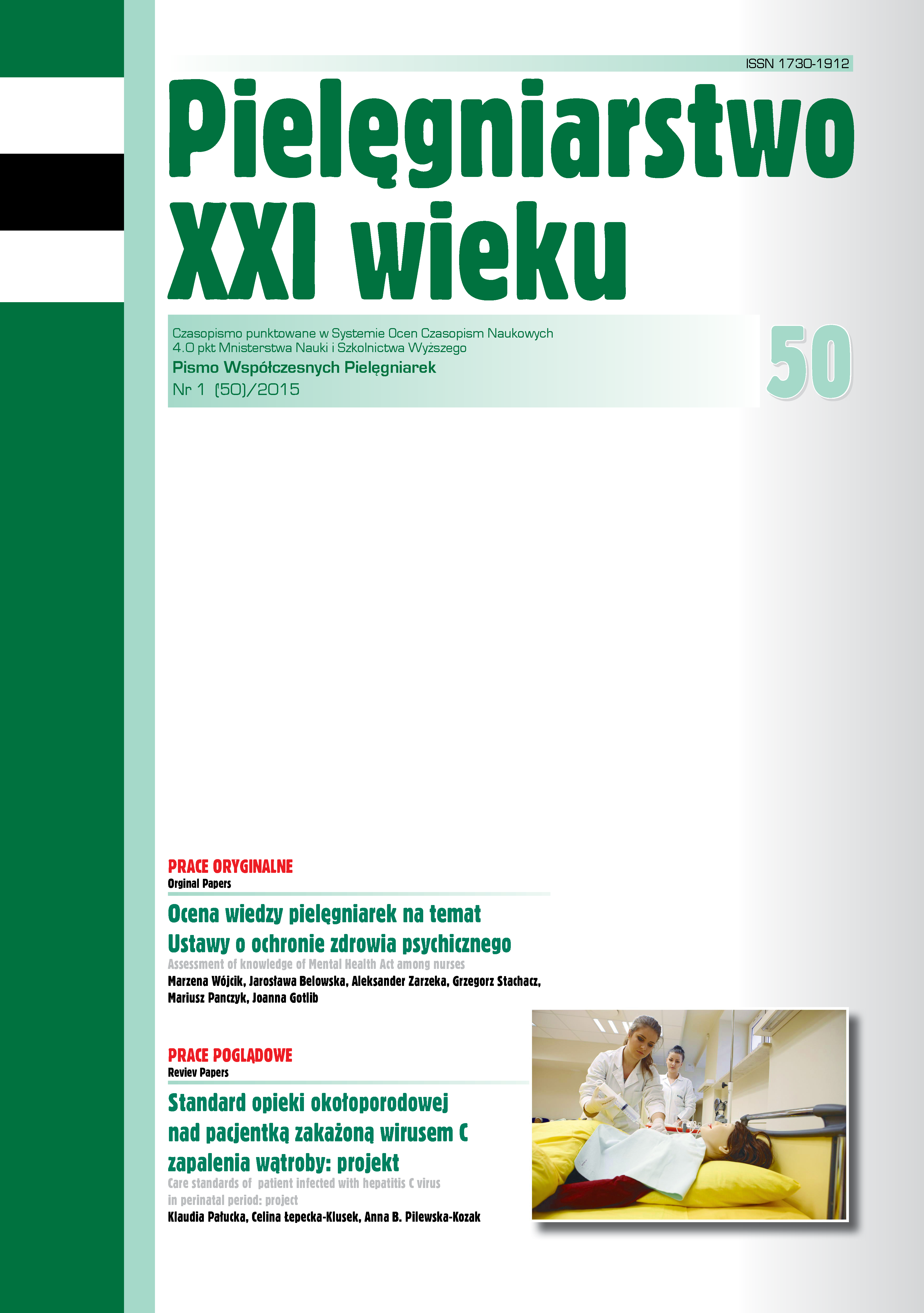Ocena wiedzy członków rodzin na temat praw pacjenta w stanie nagłego zagrożenia życia leczonego w oddziale intensywnej terapii
DOI:
https://doi.org/10.12923/p21w-2015-1/01Słowa kluczowe:
poziom wiedzy, prawa pacjent, OIT, członkowie rodziny, stan nagłego zagrożenia życiaAbstrakt
OCENA WIEDZY CZŁONKÓW RODZIN NA TEMAT PRAW PACJENTA W STANIE NAGŁEGO ZAGROŻENIA ŻYCIA LECZONEGO W ODDZIALE INTENSYWNEJ TERAPII
Wprowadzenie. W stanie nagłego zagrożenia życia konieczna jest natychmiastowa pomoc medyczna. W przypadku pacjentów w stanie bezpośredniego zagrożenia życia, ze względu na wspomniane zagrożenie, bardzo często odchodzi się od części działań proceduralnych. Lekarze w swoich działaniach nie są również związani koniecznością otrzymania świadomej zgody pacjentów na wykonanie procedury czy zabiegu medycznego.
Cel pracy. Próba oceny wiedzy rodzin na temat praw pacjenta w stanie nagłego zagrożenia życia w oddziale intensywnej terapii.
Materiał i metody. 107 osób – rodziny oraz bliscy osób w stanie nagłego zagrożenia życia przebywających w Oddziale Intensywnej Terapii Szpitala Solec Sp. z o. o. W badaniu zastosowano autorski kwestionariusz ankiety.
Wyniki. Najczęstszym źródłem informacji na temat praw pacjentów dla respondentów jest Internet (29%), a dla kolejnych 11% głównym źródłem wiedzy są ich znajomi. Połowa respondentów biorących udział w badaniu kwestionariuszowym (57%) przyznała, że nie uzyskała od personelu medycznego żadnych informacji na temat praw, jakie przysługują ich bliskim podczas pobytu w szpitalu. Zdaniem większości respondentów (69%) pacjenci w stanie nagłego zagrożenia życia, podobnie jak pacjenci, których życiu nie zagraża bezpośrednie niebezpieczeństwo mają prawo odmówić wykonania przez personel medyczny określonego działania diagnostycznego, zabiegu medycznego czy dokonania interwencji medycznej.
Wnioski. 1. Większość ankietowanych ocenia swój poziom wiedzy na temat praw pacjenta jako dostateczny. Choć nie wszyscy badani interesują się tą problematyką to jednak większość z nich jest chętna do rozszerzania swojej wiedzy na ten temat. 2. Personel medyczny nie stanowi ważnego źródła wiedzy respondentów na temat praw pacjenta. 3. Większość ankietowanych nie miała szansy zapoznania się z treścią Karty Praw Pacjenta. 4. Zdaniem rodzin i bliskich osoby w stanie nagłego zagrożenia życia oraz osoby, których życiu nie zagraża bezpośrednie niebezpieczeństwo mają różne prawa. 5. Wiedza rodzin i bliskich osób w stanie nagłego zagrożenia życia w zakresie ich dostępu do dokumentacji medycznej dotyczącej pacjenta nie jest wysoka. Wielu respondentów nie ma wiedzy na temat zakresu informacji, jakie mogą otrzymywać od personelu medycznego. 6. Wiedza rodzin i bliskich osób w stanie nagłego zagrożenia życia jest niższa niż deklarowane przez respondentów subiektywne poczucie znajomości praw pacjenta.
Bibliografia
1. Boratyńska M, Konieczniak P. Prawa pacjenta. Warszawa: Wydawnictwo Difin, 2001.
2. Włodarczyk C, Karkowska D. O prawach pacjenta i Rzeczniku Praw Pacjenta w Polsce. Neurologia Praktyczna. 2010; 10(3): 87-92.
3. Wroński K. Znajomość Praw Pacjenta przez osoby chore leczone w Klinice Chirurgii Onkologicznej Uniwersytetu Medycznego w Łodzi. Onkologia Polska. 2007; 10 (2): 75- 83.
4. Kozłowska KB. Europejska Karta Praw Pacjentów - punkty wspólne i rozbieżności. Standardy Medyczne. 2005; (7): 54-58.
5. Atras A, Patryn R, Marczewski K. Procesy diagnostyczno-lecznicze a potrzeba udzielenia zgody przez pacjenta w opinii lekarzy. Przegląd Lekarski. 2007; 64: 525-527.
6. Iwanowicz-Palus G. Znajomość praw pacjenta. Zdrowie Publiczne 2002; (3): 320-325.
7. Sprawozdanie Instytutu Praw Pacjenta i Edukacji Zdrowotnej za rok 2012/2013 http:// www.prawapacjenta.eu/var/media/File/Sprawozdanie_IPPEZ_2011.pdf [dostęp on-line: 23.05.2014]
8. Hajduk Ł, Binkowska-Bury M, Jacek A. Informowanie o prawach pacjenta przez personel medyczny. Przegląd Medyczny Uniwersytetu Rzeszowskiego Instytutu Leków. 2011; 9 (3): 348-358.
9. Atras A, Marczewski K. Znaczenia świadomej zgody na leczenie pacjenta. Zdrowie Publiczne. 2004; 114 (3): 350-355.
10. Olejniczak M, Michowska M, Basińska K. Opinie studentów Gdańskiego Uniwersytetu Medycznego na temat przestrzegania praw pacjenta w czasie odbywania zajęć klinicznych. Ann. Acad. Med. Gedan. 2011; 41: 79-87.
11. Zajdel J, Górski P. Analiza komunikacji lekarz-chory w świetle wybranych cech demograficznych i klinicznych. Medycyna Praktyczna. 2010; 61 (2): 165-181.
Pobrania
Opublikowane
Numer
Dział
Licencja
Prawa autorskie (c) 2024 Magdalena Gocel, Anna Kaczyńska, Jarosława Belowska, Aleksander Zarzeka, Grzegorz Stachacz, Aneta Król, Joanna Gotlib (Autor)

Utwór dostępny jest na licencji Creative Commons Uznanie autorstwa 4.0 Międzynarodowe.




